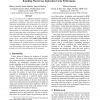Free Online Productivity Tools
i2Speak
i2Symbol
i2OCR
iTex2Img
iWeb2Print
iWeb2Shot
i2Type
iPdf2Split
iPdf2Merge
i2Bopomofo
i2Arabic
i2Style
i2Image
i2PDF
iLatex2Rtf
Sci2ools
129
Voted
RTSS
1994
IEEE
1994
IEEE
Bounding Worst-Case Instruction Cache Performance
The use of caches poses a difficult tradeoff for architects of real-time systems. While caches provide significant performance advantages, they have also been viewed as inherently unpredictable since the behavior of a cache reference depends upon the history of the previous references. The use of caches will only be suitable for realtime systems if a reasonably tight bound on the performance of programs using cache memory can be predicted. This paper describes an approach for bounding the worstcase instruction cache performance of large code segments. First, a new method called Static Cache Simulation is used to analyze a program's control flow to statically categorize the caching behavior of each instruction. A timing analyzer, which uses the categorization information, then estimates the worst-case instruction cache performance for each loop and function in the program.
Related Content
| Added | 09 Aug 2010 |
| Updated | 09 Aug 2010 |
| Type | Conference |
| Year | 1994 |
| Where | RTSS |
| Authors | Robert D. Arnold, Frank Mueller, David B. Whalley, Marion G. Harmon |
Comments (0)

